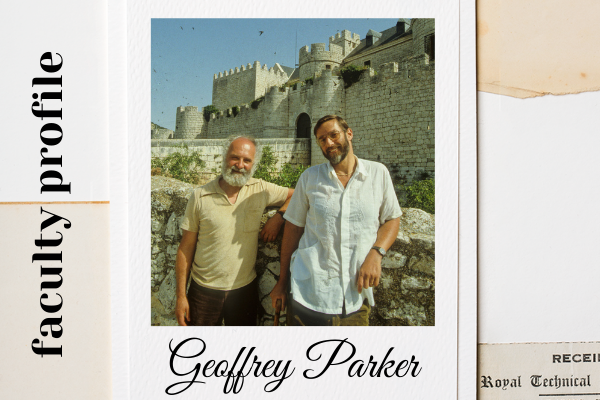Faculty Q&A Spotlight: Geoffrey Parker

What is your favorite class to teach? Why?
I teach courses from 1000 to 8000 and love them all, but I do have a favorite activity in the seminars, graduate and undergraduate alike: a session in which each seminarian presents a “sales pitch” to explain why we all must learn about their project. They can use any format, but they must finish in 10 minutes or less. I got the idea while I taught at UIUC in the 1980s, and still remember some of the devices used by seminarians there and later. Last year an UG had pre-recorded the entire presentation and simply played it in DH 168: it was electrifying!
Tell us about your current research.
I’m working on a new edition of the only book I have co-authored: The Spanish Armada, written with Colin Martin (pictured with me in the photo above), an underwater archeologist. We timed the first edition to appear in 1988, the quatercentenary of the ill-fated Armada, and while I worked in the Spanish state archives in Simancas castle, Colin would send me photographs of the artifacts he had recovered from the wrecks of Armada ships. I then combed through the bundles of administrative papers for that same ship – mostly lists of the equipment embarked before she left for England – to locate relevant details and descriptions. One day I found a list of bronze cannon embarked on one of the ships he had excavated, and noticed there were four, whereas the divers had only recovered three – so there was almost certainly one more on the sea bed. The next year the divers went back and found it. Since 1988, excavations of some more Armada ships have taken place and thousands of pages of sources and studies have appeared in print. This new information will enrich the revised edition.
How did you first get started in the field of history? What inspired you?
I think that moment came as I listened one Sunday afternoon to “The Brains Trust”: a weekly radio programme in which a panel of experts – “brains” – from a wide variety of disciplines answered questions sent in by listeners. In its prime, the programme received each week 4,000-5,000 letters containing questions; and every Sunday almost one-third of the British population tuned in to hear the erudite yet unscripted discussion of possible answers. I was about 12 when I heard the following question put to Sir Denis Brogan, an expert on American and French history: “What is the connection between the battle of Cannae and the battle of Stalingrad?” I now think Brogan knew the answer immediately, but to humour the radio audience he worked his way aloud through a list of possible links:
- Of course they’re both battles – but you already told us that!
- So was it the dates: 216 BC/1942)? No.
- Was it the location: Italy/Russia, no; plain/city? No.
- What about the protagonists: Rome v Carthage; Germany v USSR? No.
- So ... was it the commanders? “At Cannae, Hannibal defeated Aemilius Paulus; at Stalingrad, Chuikov defeated [pregnant pause, which is why I now think Brogan knew the answer all along!]... Friedrich von Paulus. Ah yeeees. I think that must be the connection: both the defeated generals were called Paulus.”
I marvelled at both the range of Brogan’s knowledge and the methodical way he deployed it: he compared first time, then space, and finally participants. I remember thinking at that moment: “I wish I could do that”. I’m still trying.
What’s a fun fact about you that we might not know?
Two staff members of the History Department believe that the audio book version of my Emperor: a new life of Charles V was not recorded by Nigel Paterson, as stated on the box set, but by me.
What do you do for entertainment in your “down time” (during COVID or non-COVID)?
Since I’m confined to a wheelchair, in some respects COVID allows me to do more than before: I can now attend lectures and conferences in distant places that I could never have reached in person – but of course that does not compensate for not seeing and hugging my children and grandchildren.
